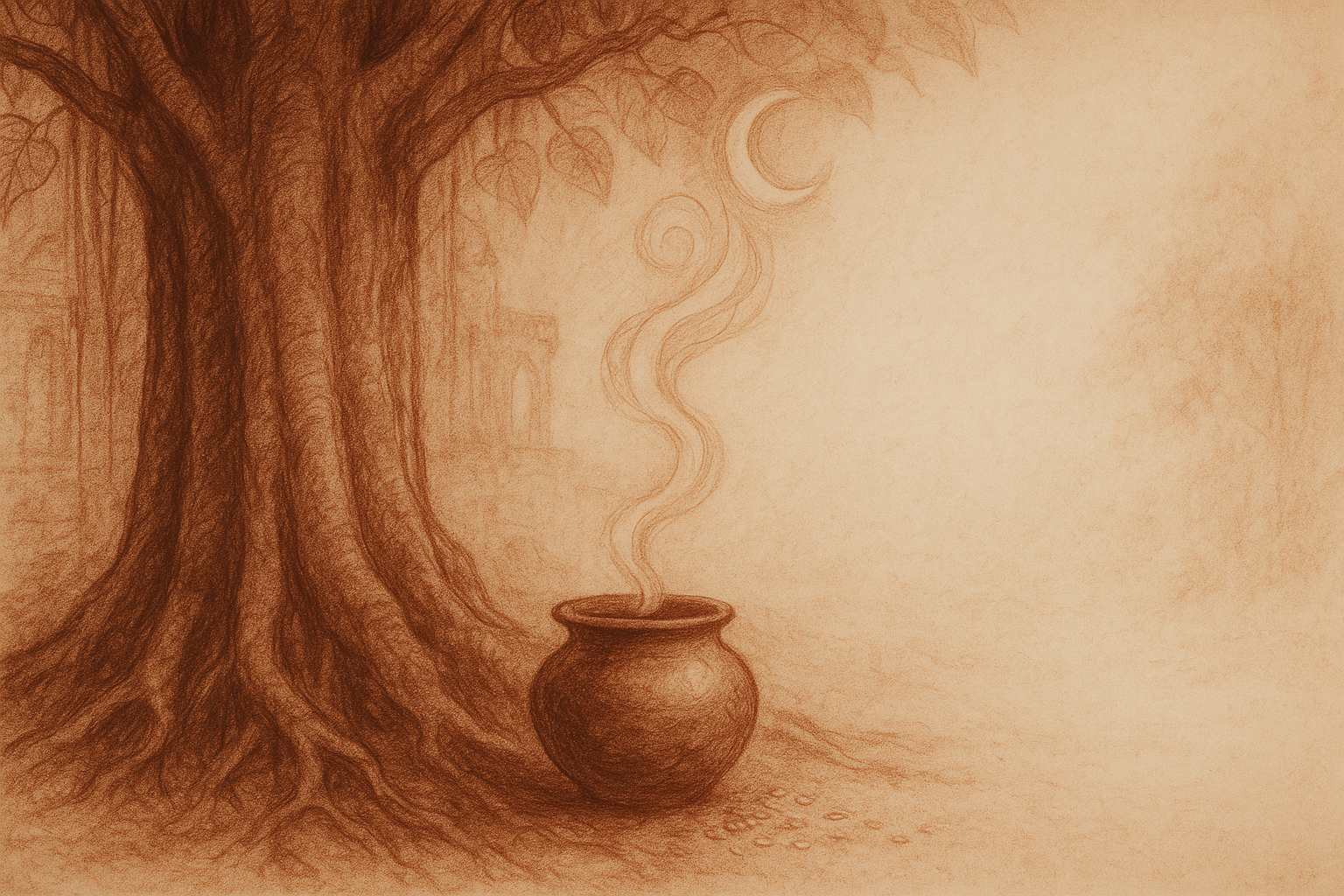Complimentary worldwide shipping on orders over $400 · No import tariffs for most countries
Complimentary worldwide shipping on orders over $400 · No import tariffs for most countries

The Rice Pot That Talked Beneath the Bodhi Tree
In the village of Srey Lok, where dust settled thick on roads too narrow for ambition, lived a widow named Amara, whose heart was as generous as her rice bowl was empty. She dwelled alone beneath the benevolent limbs of an ancient banyan, yet loneliness never lingered long by her side. She whispered softly to the moon, and listened kindly when the wind spoke. Villagers, busy chasing wealth they could neither hold nor savour, scarcely noticed her.
One gentle evening, beneath the banyan’s winding roots, Amara discovered an old earthen rice pot, smooth with touch, softly cracked with age, yet as sturdy as temple stones. Believing it abandoned, she lifted it tenderly, whispering gratitude as she cradled it homeward. But as she walked, the pot murmured in reply:
“Just one scoop, Amara. One perfect scoop, no more, no less.”
Startled, she nearly dropped it, but wisdom had taught her never to quarrel with talking pots. She nodded reverently, offering quiet thanks. Each morning thereafter, precisely at dawn, the pot granted her one perfect scoop of rice—grains radiant and fragrant as jasmine at twilight. Amara ate humbly, shared freely, and soon her quiet life blossomed into gentle abundance beneath the banyan’s shelter.
Yet in Srey Lok, whispers moved swifter than kindness. Word reached the ears of Rathana, a merchant whose wealth had swelled his pride into blindness. His heart, hollowed by envy, demanded possession of all precious things, and so he devised a cunning plan.
Under cover of darkness, Rathana crept into Amara’s hut, stealing the rice pot and retreating like a shadow to his grand hall. Gleeful and smug, he placed it upon a pedestal of gold, commanding it to produce rice. But the pot, steadfast as aged stone, refused.
“One perfect scoop, no more, no less,” it gently repeated.
Enraged, Rathana struck the pot, demanding obedience. The pot trembled softly, then began to sing—a mischievous melody, rising louder than monks chanting at dawn. Rathana’s eyes widened as the pot sang higher still, drawing astonished villagers to witness the spectacle.
“Cease your singing, wretched clay!” Rathana shouted. Yet the pot only sang louder, spinning lyrics that mocked greed, pride, and foolish ambition. Laughter rippled through the gathered crowd, then hushed as the pot began to quiver. Wisps of steam spiralled upward, swirling into clouds thick as monsoon skies.
“Too much, too little, never enough!” cried the pot. And at those words, it tipped wildly, releasing torrents of rice. First trickles, then streams, then rivers cascaded forth, flooding Rathana’s hall, spilling endlessly into streets and alleys, courtyards and kitchens. Villagers stumbled and flailed, lost in absurdity as rice poured richly, ceaselessly, relentlessly.
Only Amara remained untouched, seated in serene stillness beneath the bodhi tree at the village edge. She watched in quiet wonder as Rathana’s wealth dissolved into a sea of futile abundance. Rathana himself, drenched in humiliation, gasped for forgiveness, choking on rice and pride alike.
At last Amara rose gently, returning slowly through the rice-flooded streets. With a single soft word, the pot ceased its chaos, returning to humble silence. Villagers stood chastened and bewildered, eyes lowered before the widow whose simplicity they had long ignored.
“Take it back,” Rathana pleaded, his voice humbled and trembling. Amara smiled gently, shaking her head.
“It was never mine,” she murmured, glancing upward to the banyan branches and the laughing moon beyond.

Amara, beneath the bodhi tree, offers a single perfect scoop—
neither too little, nor too much.
In her stillness, the village remembers what it means to be full.
From that day onward, life in Srey Lok shifted gently. Greed no longer quickened their hearts; simplicity nourished each breath. And each dawn beneath the bodhi tree, Amara smiled softly, sharing her single scoop of rice with all who approached—not too little, never too much, always perfectly enough.
When children asked why she kept no riches for herself, she would laugh gently, her voice lingering like laughter after rainfall, and whisper:
“What greater wealth is there than knowing enough?”
Also in Library

Stone That Remembers the Sky
1 min read
This poem listens to Angkor not as ruin, but as grammar—where moss, shadow, and proportion carry devotion forward without spectacle. What endures here is not glory, but measure: a way of standing that no longer needs witnesses.

Rice-Ghost and the Seven Drums
3 min read
At harvest, the danger is not hunger but forgetting how to listen.
This folklore retelling speaks of drums struck for silence, of grain taken without gratitude, and of a narrow figure who does not punish—only waits. A tale of pacts made not with spirits, but with attention itself.

Naga Vow
2 min read
A lost city sleeps in the jungle, its thresholds carved with serpents — not ornament, but law. This vow-poem enters love as sacred hunger: desire as guardianship, devotion as possession, the body speaking without language. A liturgy of heat, roots, rain, and the terrible tenderness of being claimed.
Join My Studio Journal
Receive occasional letters from my studio in Siem Reap—offering a glimpse into my creative process, early access to new fine art prints, field notes from the temples of Angkor, exhibition announcements, and reflections on beauty, impermanence, and the spirit of place.
No noise. No clutter. Just quiet inspiration, delivered gently.
Subscribe and stay connected to the unfolding story.

Join My Studio Journal
Receive occasional letters from my studio in Siem Reap—offering a glimpse into my creative process, early access to new fine art prints, field notes from the temples of Angkor, exhibition announcements, and reflections on beauty, impermanence, and the spirit of place.
No noise. No clutter. Just quiet inspiration, delivered gently.
Subscribe and stay connected to the unfolding story.
